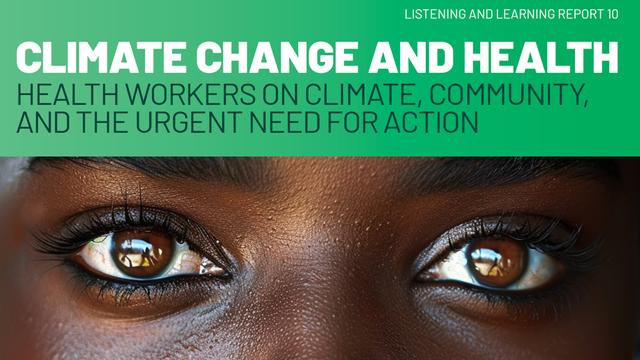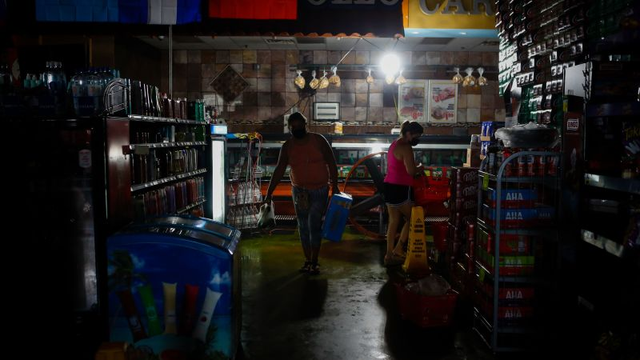Community-led initiatives have shown success in driving climate action. Ignoring them in favor of top-down tech solutions misses the mark. #LocalAction #SustainableCommunities
#localAction
A friend in the county health department drew our attention to this recent video (she appears in a b-roll clip) and told us that this is one reason she keeps working after customary retirement age.
Enthusiasm all around for a local program to bring health care to people in Minneapolis and environs.
Things are going to you-know-what in 'Murica but in Minnesota and Minneapolis, as I'm sure is the case elsewhere, many are working to make things better.
Think of the helpers.
"We have to stand as a society and say that we care."
https://www.youtube.com/watch?v=lCA58nnFUag
Health at COP29: Workforce crisis meets climate crisis
Health workers are already being transformed by climate change. COP29 stakeholders can either support this transformation to strengthen health systems, or risk watching the health workforce collapse under mounting pressures.
The World Health Organization’s “COP29 Special Report on Climate Change and Health: Health is the Argument for Climate Action“ highlights the health sector’s role in climate action.
Health professionals are eyewitnesses and first responders to climate impacts on people and communities firsthand – from escalating respiratory diseases to spreading infections and increasing humanitarian disasters.
The report positions health workers as “trusted members of society” who are “uniquely positioned” to champion climate action.
The context is stark: WHO projects a global shortage of 10 million health workers by 2030, with six million in climate-vulnerable sub-Saharan Africa. Meanwhile, our communities and healthcare systems already bear the costs of climate change through increasing disease burdens and system strain.
Health workers are responding, because they have to. Their daily engagement with climate-affected communities offers insights that can strengthen both health systems and climate response – if we learn to listen.
A “fit-for-purpose” workforce requires rethinking learning and leadership
WHO’s report acknowledges that “scale-up and increased investments are necessary to build a well-distributed, fit-for-purpose workforce that can meet accelerating needs, especially in already vulnerable settings.” The report emphasizes that “governments and partners must prioritize access to decent jobs, resources, and support to deliver high-quality, climate-resilient health services.” This includes ensuring “essential protective equipment, supplies, fair compensation, and safe working conditions such as adequate personnel numbers, skills mix, and supervisory capacity.”
Resources, skills, and supervision are building blocks of every health system.
They are necessary but likely to be insufficient.
Such investments could be maximized through cost-effective, scalable peer learning networks that enable rapid knowledge sharing and solution development – as well as their locally-led implementation.
The WHO report calls for “community-led initiatives that harness local knowledge and practices.”
Our analyses – formed by listening to and learning from thousands of health professionals participating in the Teach to Reach peer learning platform – suggest that the expertise developed by health professionals through daily engagement with communities facing climate impacts is key to problem-solving, to implementing local solutions, and to ensure that communities are part and parcel of such solutions.
Why move beyond seeing health workers as implementers of policies or recipients of training?
We stand to gain much more if their leadership is recognized, nurtured, and supported.
This is a notion of leadership that diverges from convention: if health workers have leadership potential, it is because they are uniquely positioned to turn what they know – because they are there every day – into action.
Peer learning has the potential to significantly accelerate progress toward country and global goals for climate change and health.
By making connections, a health professional expands the horizon of what they are able to know.
At the Geneva Learning Foundation, we have seen that such leadership emerges when health workers are empowered to:
- share and validate their experiential knowledge;
- develop, test, and implement solutions with the communities they serve, using local resources;
- connect with peers facing similar challenges; and
- inform policy based on ground-level realities.
Working with a global community of community-based health workers, we co-developed the Teach to Reach platform, community, and network to listen and learn at scale. Unlike traditional training programs, Teach to Reach creates a peer learning ecosystem where:
- Health workers from over 70 countries connect directly to share experiences.
- Solutions are crowdsourced from those closest to the challenges.
- Knowledge flows horizontally rather than just vertically.
- Local innovations are rapidly shared and adapted across contexts.
For example, in June 2024, over 21,000 health professionals participated in Teach to Reach 10, generating hundreds of real-world stories and insights about climate change impacts on health.
The platform has proven particularly valuable in fragile contexts and resource-limited settings, where traditional capacity building approaches often struggle to reach or engage health workers effectively.
This approach does not replace formal institutions or traditional scientific methods – instead, it creates new pathways for knowledge to flow rapidly between communities, while building the collective capacity needed to respond to accelerating climate impacts on health.
Already, this demonstrates the untapped potential for health workers to contribute to our collective understanding and response.
But we do not stop there.
As we count down to Teach to Reach 11, participants are now sharing how they have actually used and applied this peer knowledge to make progress against their local challenges.
They cannot do it alone.
This is why we ask global partners to join and contribute to this emergent, locally-led leadership for change.
How different is this ‘ask’ from that of global partners asking health workers to contribute to the climate change and health agenda?
WHO’s COP29 report makes a powerful case that “community-led initiatives that harness local knowledge and practices in both climate action and health strategies are fundamental for creating interventions that are both culturally appropriate and effective.”
Furthermore, it recognizes that “these initiatives ensure that climate and health solutions are tailored to the specific needs and realities of those most impacted by climate change but also grounded in their lived realities.”
What framework for collaboration?
The path forward requires what the report describes as “cooperation across sectors, stakeholders and rights-holders – governmental institutions, local authorities, local leaders including religious authorities and traditional medicine practitioners, NGOs, businesses, the health community, Indigenous Peoples as well as local communities.”
Our experience with Teach to Reach demonstrates how such cooperation can be facilitated at scale through digital platforms that enable peer learning and knowledge sharing. Key elements include:
- a structured yet flexible framework for sharing experiences and insights;
- direct connections between health workers at all levels of the system;
- rapid feedback loops between local implementation and broader learning;
- support for health workers to document and share their innovations; and
- mechanisms to validate and spread effective local solutions.
WHO’s recognition that health workers have “a moral, professional and public responsibility to protect and promote health, which includes advocating for climate action, leveraging prevention for climate mitigation and cost savings, and safeguarding healthy environments” sets a clear mandate.
This WHO report highlights the need for new ways of supporting community-led learning and action to:
- support the rapid sharing of local solutions;
- build health worker capacity through peer learning;
- connect communities facing similar challenges; and
- enable health workers to lead change in their communities
Reference
Neira, M. et al. (2024) COP 29 Special Report on Climate Change and Health: Health is the Argument for Climate Action. Geneva, Switzerland: World Health Organization.
Image: The Geneva Learning Foundation Collection © 2024
Share this:
#climateAction #climateAndHealth #COP29 #COP29SpecialReportOnClimateChangeAndHealthHealthIsTheArgumentForClimateAction #healthWorkers #HRH #leadership #localAction #MariaNeira #resilience #WorldHealthOrganization
Balancing tradition and change isn’t easy, but in every challenge is an opportunity for growth. What are you fighting for in your community? 🗣️ #LocalAction #ProgressiveVoices
Can Teach to Reach help your organization?
Teach to Reach stands as a unique nexus in the global health landscape, offering unprecedented opportunities for diverse stakeholders to engage, learn, and drive meaningful change.
With over 60,000 participants from more than 90 countries, this platform, network, and community bring together a mix of frontline health workers, policymakers, and key decision-makers.
At Teach to Reach, research institutions and academic researchers engage health workers to translate their findings into policy and practice
For research institutions and academic partners, Teach to Reach provides a site for knowledge translation.
It provides direct access to practitioners and policymakers at all levels, enabling researchers to share findings with those best positioned to apply them in real-world settings.
The platform’s interactive features, such as “Teach to Reach Questions,” allow for rapid data collection and feedback, helping bridge the gap between research and practice.
At Teach to Reach, global agencies can listen and learn with local communities
Global health organizations can leverage Teach to Reach to gain invaluable insights into unmet needs of local communities.
With half of the participants working in districts and local facilities, and many in challenging contexts such as armed conflict zones (1 in 5) or remote rural areas (>60%), partners can engage with ground-level perspectives that inform development, strategies, and programme design.
This direct engagement with frontline workers offers a unique window into the realities of diverse health systems.
At Teach to Global, global actors help elevate the voices and leadership of local actors
For those looking to make a tangible impact on global health equity, Teach to Reach’s scholarship programme offers a compelling opportunity.
Scholarship sponsors support health workers from low and middle-income countries to participate in Teach to Reach.
This investment not only builds individual capacity but strengthens health systems by recognizing and amplifying health worker voices and expertise.
Facilitate meaningful dialogue on critical issues
Global health stakeholders find in Teach to Reach a platform that facilitates meaningful dialogue on critical issues.
The diverse participant base, including national policymakers and heads of national programmes, creates an environment ripe for new kinds of inclusive dialogue that can shape national and global strategies and frameworks.
Become a Teach to Reach sponsor
This mix of participants offers partners a unique opportunity to engage with key decision-makers in an interactive, collaborative setting.
Some partners also become sponsors by contributing to the costs.
For example, partners can sponsor scholarships for health workers to support their participation in Teach to Reach.
This is just one of the ways in which partners can help sustain Teach to Reach as a platform, network, and community.
For private sector organizations, sponsoring Teach to Reach aligns seamlessly with corporate social responsibility goals in global health.
By this platform, organizations can articulate their concrete commitment to strengthening health systems, showing their support to health workers, and promoting health equity.
This engagement goes beyond traditional philanthropy, offering sponsors a way to showcase their dedication to improving global health outcomes while enhancing their reputation in the field.
In essence, Teach to Reach offers a multifaceted value proposition for partners.
It is a place to listen and learn, to share and collaborate, to influence and be influenced.
Whether an organization’s goals revolve around research impact, market insights, policy influence, or social responsibility, Teach to Reach provides a unique, efficient, and impactful site to engage.
By joining this community, partners do not just support a platform – they become part of a movement that is reshaping how we approach global health challenges, one connection at a time.
Share this:
#Dialogue #knowledgeTranslation #localAction #localization #peerLearning #TeachToReach
Leadership, representation, power = we find them all right here, in our communities.
We love this new film by We're Right Here: the campaign for community power. Join their call for a Community Power Act to make it easier for local people to unlock positive change for their places.
This video was prepared by the World Health Organization with voices of health workers speaking at the Special Event “From community to planet” hosted by The Geneva Learning Foundation.
https://www.youtube.com/watch?v=IYdH3OrNB90
The Geneva Learning Foundation (TGLF) has developed a new model that could help address the urgent challenge of climate change impacts on health by empowering and connecting health workers who serve communities on the receiving end of those impacts.
This model leverages TGLF’s track record of facilitating large-scale peer learning networks to generate locally-grounded evidence, elevate community voices, and drive policy change.
A key strength of TGLF’s approach is its ability to rapidly connect diverse networks of health workers across geographic and health system boundaries.
For example, in March 2020, with support from the Bill and Melinda Gates Foundation, TGLF worked with a group of 600 of its alumni – primarily government staff working in local communities of Africa, Asia, and Latin America – to develop the Ideas Engine.
Within two weeks, the Ideas Engine had connected over 6,000 immunization staff from 90 countries to share strategies for maintaining essential services during the COVID-19 pandemic.
Within just 10 days, participants contributed 1,235 ideas and practices.
They then developed and implemented recovery plans, learning from and supporting each other.
Within three months, over a third of participants reported successfully implementing their plans, informed by these crowdsourced insights.
This illustrates how peer learning – a tenet of TGLF’s model – can facilitate and accelerate problem-solving.
The Ideas Engine became a core component of TGLF’s model for turning knowledge into action, results, and impact.
TGLF has also demonstrated the model’s effectiveness in informing global health policy initiatives.
Working with the Wellcome Trust, TGLF mobilized – in the first year – over 8,000 health professionals from 99 low- and middle-income countries to take ownership of the goals of the Immunization Agenda 2030 (IA2030) strategy.
This participatory approach generated over 500,000 data points in just four months, providing IA2030 stakeholders with valuable, contextually-grounded evidence to inform decision-making.
Fostering a culture of continuous learning and adaptation among health workers lays the groundwork for a more resilient, equitable, and sustainable approach to global health in the face of accelerating climate change.
Applying this model to the climate and health nexus, TGLF supported 4,700 health workers from 68 countries in 2023 to share observations of changes in climate and health in the communities they serve.
Over 1,200 observations highlighted the diverse and severe consequences already being experienced.
See what we learned: Investing in the health workforce is vital to tackle climate change: A new report shares insights from over 1,200 on the frontline
This demonstrates the feasibility of rapidly generating a new kind of evidence base on local climate-health realities.
Furthermore, if we assume that each health worker could reduce the climate-related health burden for those they serve by a modest five percent, a million health workers connected to and learning from each other could make a significant dent in climate-attributable disease and death.
This illustrates the model’s potential to achieve population-level impact, beyond sharing knowledge and strengthening capacity.
https://www.youtube.com/watch?v=ModBatuNefg
At Teach to Reach 10 on 20-21 June 2024, over 20,000 health workers will be sharing experience of their responses to the impacts of climate change on health. Learn more…
It is important to note that TGLF’s approach differs from models that work through health professional associations in several key ways.
First, it directly engages health workers across all levels of the health system, not just those in leadership positions.
Second, it focuses on peer learning and locally-led action, rather than top-down dissemination of information.
Third, it leverages digital technologies to connect health workers across geographies and hierarchies, enabling rapid exchange of insights and innovations at the point of need.
Finally, it embeds participatory and citizen science methods to ensure solutions are grounded in community needs and that everyone can contribute to climate and health science.
TGLF’s model offers a complementary pathway to address current global priorities of generating novel evidence on climate-health impacts in ways that are directly relevant and useful to communities facing them.
This model can help fill critical evidence gaps, identify locally-adapted solutions, and build momentum for transformative change.
TGLF’s track record in mobilizing collective intelligence to drive impact in global health crises suggest transferability to the climate and health agenda.
As the world grapples with the accelerating health threats posed by climate change, investing in health workers as agents of resilience has never been more urgent or important.
Share this:
#BMGF #GlobalClimateAndHealthAlliance #health #IdeasEngine #ImmunizationAgenda2030 #localAction #MariaNeira #TheGenevaLearningFoundation #Wellcome #WHA77 #WorldHealthAssembly
As world leaders gathered for the COP28 climate conference, the Geneva Learning Foundation called for the insights of health workers on the frontlines of climate and health to be heard amidst the global dialogue.
Ahead of Teach to Reach 10, a new eyewitness report analyses 219 new insights shared by 122 health professionals – primarily those working in local communities across Africa, Asia and Latin America – to two critical questions: How is climate change affecting the health of the communities you serve right now? And what actions must world leaders take to help you protect the people in your care?
(Teach to Reach is a regular peer learning event. The tenth edition on 20-21 June 2024 is expected to gather over 20,000 community-based health workers to share experience of climate change impacts on health. Request your invitation here.)
Their answers paint a picture of the accelerating health crisis unfolding in the world’s most climate-vulnerable regions. Community nurses, doctors, midwives and public health officers detail how volatile weather patterns are driving up malnutrition, infectious disease, mental illness, and more – while simultaneously battering health systems and blocking patient access to care.
Yet woven throughout are also threads of resilience, ingenuity and hope. Health advocates are not just passively observing the impacts of climate change, but actively responding – often with scarce resources. From spearheading tree-planting initiatives to strengthening infectious disease surveillance to promoting climate literacy, they are innovating locally-tailored solutions.
Importantly, respondents emphasize that climate impacts cannot be viewed in isolation, but rather as one facet of the interlocking crises of environmental destruction, poverty, and health inequity. Their insights make clear that climate action and community health are two sides of the same coin – and that neither will be achieved without deep investment in local health workforces and systems.
Rooted in direct lived experience and charged with moral urgency, these frontline voices offer a stirring reminder that climate change is not some distant specter, but a life-and-death challenge already at the doorsteps of the global poor. As this new collection of insights implores, it’s high time their perspectives moved from the margins to the center of the climate debate.
As Charlotte Mbuh of The Geneva Learning Foundation explains: “We hope that the chorus of voices will grow to strengthen the case for why and how investment in human resources for health is likely to be a ‘best buy’ for community-focused efforts to build the climate resilience of public health systems.”
Jones, I., Mbuh, C., Sadki, R., & Steed, I. (2024). Climate change and health: Health workers on climate, community, and the urgent need for action (1.0). The Geneva Learning Foundation. https://doi.org/10.5281/zenodo.11194918
Share this:
#climateChange #communityHealth #health #HRH #HumanResourcesForHealth #localAction #TheGenevaLearningFoundation
🌱 Restore ecosystems and draw down carbon locally. Synergia MOOC highlights practical ways to meet basic needs while caring for the planet. Be part of the restoration journey from 21 Jan. https://synergiainstitute.org/ #EcologicalRestoration #LocalAction
A shame they aren't on here but #StirToAction have some great stuff on their website and have just produced a useful little book #TheABCsOfTheNewEconomy about community action and some inspiring examples of local groups doing interesting things.. it is also a step by step guide to setting up or converting an existing organisation to a #cooperative or #CommunityBenefitSociety More on the book in the link https://www.stirtoaction.com/abcs #AlernativeEconomics #LocalAction
Got weekend plans? We do!
😊HKD in Transition is relaunching as Greene Hhassocks & Ditchling with an open day
🤸♂️ Sustainable Northwich hosts the Sustainable Cheshire festival
🛠 Kew the Transition Share and Repair
🥦 Transition Town Rugby Produce Swap
🍎 Transition Haverfordwest Orchard Mawr harvest and juicing day
🎥 Transition Leytonstone film night
💧 Transition Bewdley marking Rivers Day with art, music and citizen science
🌱 Transition Evesham Vale seed swap
🎉 Transition Monmouth bringing their projects to the Action on Climate Emergency festival
🦀 Deal With It joining in the #GreatBritishBeachClean
🐟 Festival of the River Exe finale with Salmon run with Transition Exmouth Transition Exeter and Sustainable Tiverton
🎪 Sustainable Crediton Big Green Fair and Green Trail
🛌 Vision 21 gloucestershire Reclaim store is open for pre-loved furniture.
What else??
#transitiontown #climateaction #localaction #communityaction #cheshire #kent #RiverExe #Gloucestershire #Monmouth
Autumn events 🍂Transition groups doing brilliant things, upcoming events, training and more...
Check your inbox, our newsletter has just landed🦅
https://mailchi.mp/transitionnetwork/ttnewssept23
Join our mailing list here: https://trnuk.us16.list-manage.com/subscribe?u=54a12ae0dbc8dc98546e16d7f&id=b25afd8a91
#transitiontown #goodnews #climateaction #training #localaction
Gulf Coast officials are #scrambling to prepare for two weather disasters to combine in #deadly fashion
https://www.cnn.com/2023/08/19/us/hurricane-extreme-heat-gulf-coast-climate/index.html
Officials in #Miami, #NewOrleans and #Houston are now grappling with how to handle two potentially deadly #disasters set to compound: a #hurricane and #extremeheat.
Join us in wishing Clacton Community Transition Group a happy first birthday!
They've already started a grow group, energy group, a podcast, held community film nights, collected items to address the cost of living crisis and explored local wellbeing. Lots to celebrate at this evening's party
#Clacton #essex #transitiontown #community #climateaction #growyourown #energy #localaction #wellbeing #costoflivingcrisis
Trying my hand at stirring up some local action. Printed off 30 or so flyers for a meeting that my anchorage assembly person is putting on about housing challenges and zoning reform in #eagleriver and put them on the porches of a bunch of my neighbors. Included my mastadon just in case it helps anyone find the instance #strongtowns #waroncars #urbanism #localaction
#introduction
Okay, lets' try to do this properly.
I'm Jess, I'm an old Fedi hand setting up in a new neighborhood.
I write queer fiction, shared as both webserials and ebooks. Mostly SFF chosen family, some kink, lots of fucking-with-tropes.
On a personal, I'm nonbinary (they/them), Jewish, autistic, disabled, parent, polyamorous, radical, and talk about all of it.
Threadcraft (tablet weaving), herbalism/gardening/foraging, history, small scale prepping, and SCOTUS are other areas of interest I'll talk about from time to time.
I don't usually use hashtags bc I keep most posts unlisted but if I did I'd use a lot of:
#QueerBooks #AmWriting #SFF #parenting #DisabilityLife
With a fair bit of:
Poems about Chimney Swifts by #children in #Pennsylvania #birds #localaction #poetry https://www.sustainlv.org/focus-on/poems-drawings-about-the-swifts/
We need you!
Are you interested in serving on a City of Hamilton agency, board and sub-committee?
Recruitment to serve on a City of Hamilton agency, board, and sub-committee is open now until April 6, 2023, at 4:30 pm. For more information, the full list of positions and how to apply, visit hamilton.ca/Committees
Attend the Open House on Wed, March 8, from 6-8 pm at City Hall, 2nd Floor, to learn more about available opportunities and speak to Clerks staff.
#hamont #ward1 #localaction
A fascinating historical account and insight into #urbandesign, the place given to #cars, #JohnMajor & how local #resistance saved #Brixton & #London from #motorways #pollution obliteration. Support #localaction when you see it, because that's the only thing that actually makes a difference! Via @TheGuardian
https://www.theguardian.com/uk-news/2022/dec/13/londons-lost-mega-motorway-the-eight-lane-ring-road-that-would-have-destroyed-much-of-the-city




